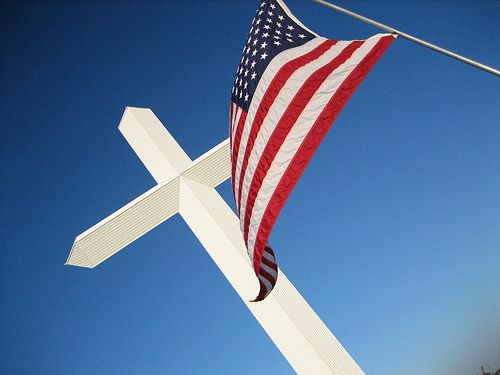
Is it that America was originally a Christian society but had recently secularized, and now needed to return to its religious roots?
By Nazarul Islam
Americans know evangelical Protestants to be moralists. Another way of putting it is “scolds.” Indeed, the conservative Christians that burst on the scene in the late 1970s with The Moral Majority mobilized politically to defend the traditional family. In practice, this meant opposition to abortion, sexual promiscuity, and homosexuality, combined with the promotion of older gender roles.
Yet they weren’t always clear about the underlying logic motivating their agenda. Was it that any nation that departs from God’s law is headed for Hades in a handbasket? Or, was it that America was originally a Christian society but had recently secularized, and now needed to return to its religious roots?
These two arguments reinforced each other. No matter which was more basic, the influence and presence of white evangelicals in American electoral politics are bound up almost exclusively with a set of moral convictions derived from their Christian beliefs.
Evangelicals have been so influential that they may even be shaping the arguments of their fiercest critics. Objectors to white evangelicals can score easy points by noting the disparity between “family values” and support for Donald Trump in 2016 and 2020. Ever since the 2016 U.S. presidential election, Trump’s critics had an easy time teeing up white evangelicals for the hypocrisy of advocating character while defending a man known more for boasting about sexual conquests than going to church.
New York Times columnist Charles M. Blow pulled this trigger recently with his column not so subtly titled, “White Evangelicals Shun Morality for Power.” He begins by quoting Franklin Graham about Bill Clinton’s affair with Monica Lewinsky. The son of famous evangelist Billy Graham had insisted that the president needed to confess and repent of his sin.
From there, Blow moves to Graham’s case for Donald Trump: not a defense of the man’s morality, but of the need to vote for a candidate who will pick the right federal justices. For Blow, concern for the courts shows that power mattered more than morality to evangelicals, since judicial appointments are “a way to lock in an ideology beyond the reach of election cycles and changing demographics at least for a generation.”
What’s striking about Blow’s essay is reliance upon the very ethical binary that has allowed critics to regard evangelicals as a threat to democracy and free society. He revealed that he had grown up in the church (but is now no longer religious), where he was taught that scripture was “was like a rock. A lie was a lie, yesterday, today, and tomorrow, no matter who told it.” So when evangelicals go along with Trump’s lies (or even lie themselves), they demonstrate a lack of faith in the Bible, which was supposed to be unchanging. He wrote, “I had hoped that there were more white evangelicals who embraced the same teachings,” who would not excuse Trump, “who would stand on principle.”
That is an odd reaction. For decades, whenever white evangelicals “stood” on the Word of God, critics blamed them for betraying America’s political ideals.
In her 2006 book “Kingdom Coming,” New York Times reporter Michelle Goldberg wrote that evangelicals who believe the Bible is free from error also dabbled in a Christian nationalism that would make abortion illegal, withdraw civil protections for homosexuals, and let loose in public schools Christians students constantly in prayer.
Chris Hedges, another reporter for the Times, also worried in his 2007 book “American Fascists” that Christian nationalist were “taking over the machinery of the U.S. state.”
Now all of a sudden, Mr. Blow wishes these same white evangelicals would stick to their convictions and what? Lead the charge for a Christian America by opposing Trumpism?
Oddly enough, the Times columnist sticks to his guns. Blow uses Christian morality to condemn white evangelicals with help from an Ivy-League professor. Anthea Butler, who teaches religion at the University of Pennsylvania, explained to Blow that America needs to stop “coddling” evangelicals – that these believers may hide behind moral issues, but are immoral in reality. According to Butler, “they believe in anti-vaxxing, they believe in racism, they believe in anti-immigration, they believe that only Republicans should run the country and they believe in white supremacy.”
It’s a breathtaking argument that vindicates the belief of white evangelicals that America needs to return to its Christian moral foundation. Blow and Butler show that if white evangelicals were more Christian, they’d possess the same moral convictions that animate op-ed writers at the Times and professors at elite universities.
[author title=”Nazarul Islam ” image=”https://sindhcourier.com/wp-content/uploads/2021/05/Nazarul-Islam-2.png”]The Bengal-born writer Nazarul Islam is a senior educationist based in USA. He writes for Sindh Courier and the newspapers of Bangladesh, India and America. He is author of a recently published book ‘Chasing Hope’ – a compilation of his 119 articles. [/author]